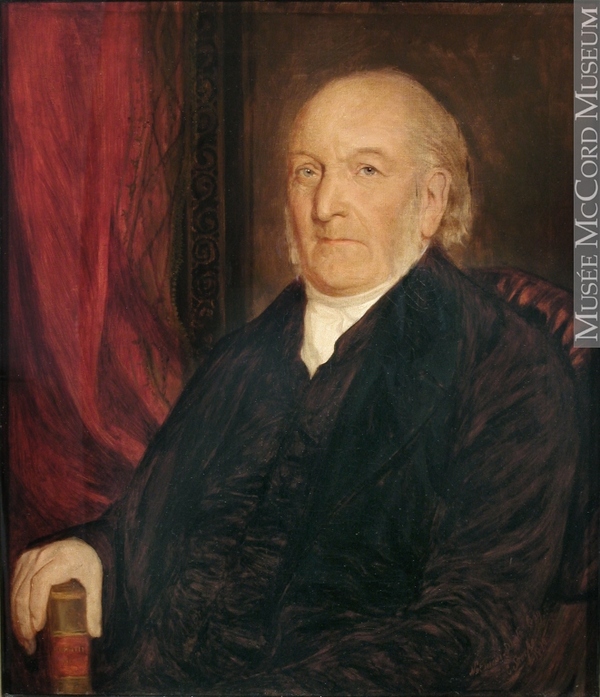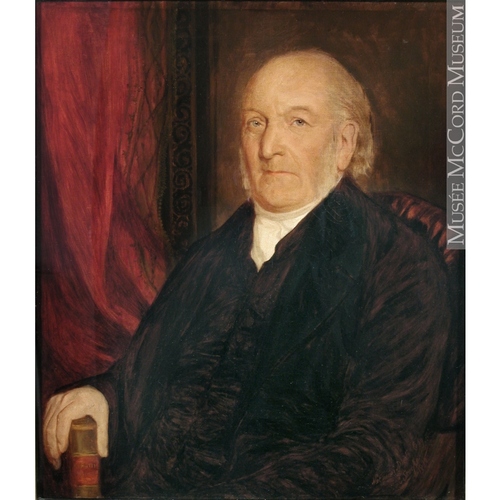
Source: Link
SKAKEL, ALEXANDER, educator; b. 22 Jan. 1776 in Fochabers, Scotland, son of Alexander Skakel; m. first 7 Jan. 1808 Isabella Skakel, a cousin, in Montreal; m. there secondly 7 July 1823 Christian Dalrymple; he had at least one daughter, who died in infancy; d. 13 Aug. 1846 in Montreal.
Alexander Skakel entered King’s College, Aberdeen, in 1789 and graduated ma five years later. He is said to have studied for the Presbyterian ministry, but he preferred to become a schoolmaster. In 1798 he went to Quebec, where he taught for a year. Invited to Montreal, he opened the Classical and Mathematical School there in 1799 and conducted it with considerable success. In 1811 some citizens collected £400 to equip his school handsomely with “philosophical apparatus” so that Skakel’s teaching might include demonstrative experiments. From 1813 Skakel gave evening lectures to adults in his home.
In 1818 Skakel was engaged as master of the Grammar School in Montreal, and he brought with him his pupils and his scientific apparatus. Like a sister institution at Quebec [see Robert Raby Burrage*], this school had been founded in 1816 under the provincial Education Act of 1801; in 1821 both received the designation “Royal” when they came under the direction of the Royal Institution for the Advancement of Learning. Skakel’s curriculum included, at the preparatory level, English, writing, arithmetic, and accounts, and at the advanced level, Latin, Greek, and natural philosophy, or science. Parents of means paid £8–£12 tuition per annum for their sons, no doubt partially subsidizing the free scholars (not necessarily paupers), of whom there were a maximum of 20 at a time until 1831. The majority Canadian party in the House of Assembly being hostile to the Royal Institution [see Joseph Langley Mills*], Skakel’s salary of £200, paid from the Jesuit estates fund, was reduced to £100 from 1831 when that fund was surrendered to the provincial legislature. As well, Skakel was obliged to teach gratis a minimum of 20 pauper students. His grants were eventually suspended.
Skakel was active in Montreal intellectual circles, in which Scots were prominent. He was a friend of John Fleming* and of the Reverend James Somerville, whom he accompanied on scientific rambles, and undoubtedly was acquainted with their Quebec friend Daniel Wilkie*. From 1822 a former student, Andrew Fernando Holmes*, added chemistry lectures to Skakel’s own evening conferences. An active member of the Natural History Society of Montreal, founded in 1827, Skakel was its president in 1835. About 1834 he was offered the post of professor of mathematics and natural philosophy at McGill College, but difficulties arising from the charter prevented the appointment’s being made. He was awarded an honorary lld by his alma mater in 1845.
Skakel also participated in social institutions of essentially Scottish foundation. One of 20 Scots who in 1807 established the Montreal Curling Club, the first such club in North America, he served as president in 1810 and 1821. At a meeting in April 1820 to raise funds for the recently founded Montreal General Hospital [see William Caldwell*], Skakel was elected to its committee of management, of which he was the chairman from 1822 to 1824. Secretary of the board of governors from 1823, he was made a governor for life in 1829.
At his death in 1846 Skakel left property valued at about £15,000 as an endowment for the hospital, subject to a life interest for his widow and brother and a constraint on the governors to provide yearly prizes of £10 for the Greek, Latin, and mathematics classes of the Royal Grammar School. His “philosophical and mathematical apparatus,” improved by additions of his own worth £200, was left to McGill College. Inventoried in his will by categories – mechanics, hydrostatics, electricity, galvanism, magnetism, optics, and astronomy – the individual items included lenses, microscopes, telescopes, models of pumps, and “a large electrical machine complete.”
A pioneer of British education in Montreal, Skakel had devoted 48 years to teaching in Lower Canada, 28 of them in the Royal Grammar School. Among his former pupils were Stephen Randal, Dr Archibald Hall*, the geologist and cartographer Sir William Edmond Logan*, Charles Richard Ogden*, attorney general of Lower Canada, and judge William Badgley*. Some success notwithstanding, Skakel’s career in teaching had not been an easy one. He must have either lived frugally or enjoyed other sources of income, for the Royal Grammar School could not have enriched him greatly. Being under the Royal Institution, it was spurned by Canadian nationalist and Roman Catholic leaders, and since it was based on the classical curriculum of the English grammar schools, it was increasingly considered irrelevant by a British élite largely involved in business and commerce. In 1843 a group of Montreal merchants and professional men, wanting a school more in tune with 19th-century ideas in education, had established the High School of Montreal, patterned on that of Edinburgh. On Skakel’s death this institution successfully petitioned to have his salary transferred to its master and absorbed the Royal Grammar School.
ANQ-M, CE1-63, 7 juill. 1823, 16 août 1846; CE1-126, 7 janv. 1808. GRO (Edinburgh), Bellie, reg. of births and baptisms, 22 Jan. 1776. McGill Univ. Arch., MG 3080; RG 4, c.100–c.102; RG 96, c.l–c.3. Univ. of Aberdeen Library, ms and Arch. Sect. (Aberdeen, Scot.), King’s College matriculation records and biog. data. L.-P. Audet, Le système scolaire, vols.3–4. R. G. Boulianne, “The Royal Institution for the Advancement of Learning: the correspondence, 1820–1829; a historical and analytical study”
Cite This Article
Stanley B. Frost, “SKAKEL, ALEXANDER,” in Dictionary of Canadian Biography, vol. 7, University of Toronto/Université Laval, 2003–, accessed April 24, 2025, https://www.biographi.ca/en/bio/skakel_alexander_7E.html.
The citation above shows the format for footnotes and endnotes according to the Chicago manual of style (16th edition). Information to be used in other citation formats:
| Permalink: | https://www.biographi.ca/en/bio/skakel_alexander_7E.html |
| Author of Article: | Stanley B. Frost |
| Title of Article: | SKAKEL, ALEXANDER |
| Publication Name: | Dictionary of Canadian Biography, vol. 7 |
| Publisher: | University of Toronto/Université Laval |
| Year of revision: | 1988 |
| Access Date: | April 24, 2025 |



